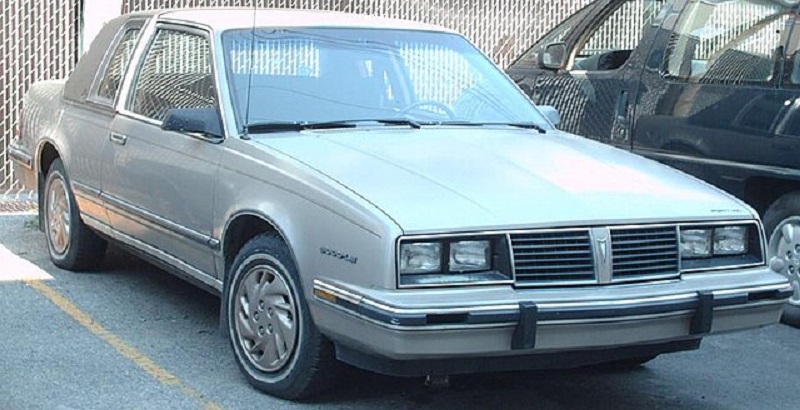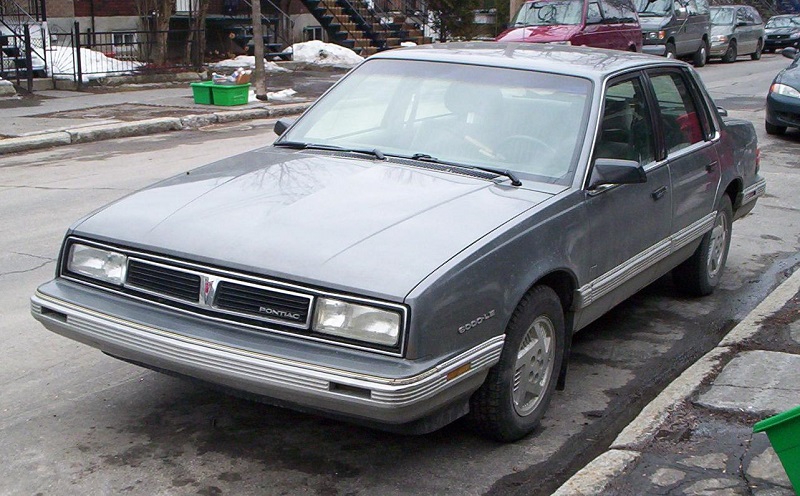Pontiac 6000: A Comprehensive Look at a Classic American Sedan:

Car fans, especially those who enjoy vintage American sedans from the 1980s and early 1990s, are drawn to the moniker Pontiac 6000. This mid-sized vehicle, which was built by General Motors’ Pontiac subsidiary, was a key part of the brand’s lineup from 1981 to 1991. Despite not being as well-known as some other Pontiac models, the 6000 has a special position in the history of the company. We’ll go into great detail on the Pontiac 6000’s history, design, performance, options, and legacy in this post.
Read more:Pontaic 2000 sunbird Specs, Review & History
The Birth of the Pontiac 6000:
As a member of General Motors’ A-body platform, which served as the foundation for the Chevrolet Celebrity, Oldsmobile Cutlass Ciera, and Buick Century, the Pontiac 6000 made its debut in 1981. Positioned as a mid-sized family sedan, the 6000 offered a harmony of utility, comfort, and performance. It was given the name 6000 in honor of the number, which at the time was supposed to represent a modern and futuristic appeal.
Design and Styling:
Exterior Design:
With its boxy, angular appearance that was both practical and fashionable for the time, the Pontiac 6000 had a design that was reminiscent of the early 1980s. The car featured rectangular headlights on either side of a large front grille that prominently showed the Pontiac badge. The overall style, which reflected the time’s tendencies in vehicle design, was simple but attractive, with crisp lines and sparse chrome embellishments.
Interior Features:
The Pontiac 6000’s interior featured a roomy and cozy cabin. The focus of the simple interior design was on usability and functionality. The dashboard included straightforward controls and big, easy-to-read gauges. It was neatly organized. The 6000 may come with a variety of options, including as air conditioning, power windows, and, in later models, a digital instrument cluster, depending on the trim level.
Engine Options and Performance:
Engine Choices:
There were numerous engine options available for the Pontiac 6000 during its entire manufacturing period. The 2.5-liter inline-four engine included in early models was renowned for its fuel efficiency despite its lackluster performance. A 2.8-liter V6 engine was also available from Pontiac for customers who wanted more power; this engine significantly improved acceleration and overall driving dynamics.
Performance Characteristics:
The Pontiac 6000’s performance was standard for mid-sized sedans at the time. It was not intended for fast driving, but rather for relaxed cruising. The handling was competent but not very sporty, and the suspension was set up for a comfortable ride. On the other hand, the vehicles with the V6 engine provided decent acceleration and were ideal for highway cruising.
Trim Levels and Special Editions:
Base and LE Trims:
Over the course of its manufacturing, the Pontiac 6000 was offered in a number of trim levels. The most economical model was the base model, which had only the most necessary features and few extras. Families choose the LE (Luxury Edition) trim because it has more comfort and convenience amenities.
STE and SE Trims:
When the STE (Special Touring Edition) was first released in 1983, purchasers seeking a more aggressive 6000 model were the target market. It included a sportier interior, an updated suspension system, and a more potent V6 engine. Similar to the STE, the SE (Special Edition) trim came with more luxury amenities and distinctive stylistic aspects. It was only offered later in the model’s existence.
The 6000 STE: A Sporty Variant:
Introduction of the 6000 STE:
Pontiac tried to add some performance-oriented flavor to the 6000 lineup with the 6000 STE. When the STE was first introduced in 1983, it was promoted as a sports sedan with European influences that offered cutting-edge technology and improved handling.
Performance Enhancements:
The 2.8-liter V6 engine that powered the STE was eventually replaced with a 3.1-liter V6 that produced more torque and power. With alloy wheels and performance tires, the car had a more aggressive stance, and the suspension was adjusted for sport use. Sport seats, a leather-wrapped steering wheel, and an innovative (for its day) electronic dashboard were among the distinctive interior features given by the STE.
Read more: ABS Sensor: Everything You Need to Know About it
Legacy of the 6000 STE:
Although it was never able to match the heights of its European rivals, such as BMW or Audi, the 6000 STE established a solid reputation as a capable sports sedan. It did, however, contribute to Pontiac’s reputation as a brand that provided functionality and performance.
Sales and Market Reception:
Initial Market Response:
The Pontiac 6000 was highly accepted by the market when it was first released. It provided a safe and cosy means of transportation, perfectly meeting the needs of the average American family. Despite its conservative design, the automobile was appealing to a wide spectrum of consumers, and its multiple trim levels made it possible to satisfy different budgets.
Sales Performance:
Throughout the 1980s, Pontiac 6000 sales were consistently high. The car profited from both the strong brand loyalty that Pontiac experienced during this time and the general popularity of mid-sized sedans. The STE model’s 1983 release increased the 6000’s allure by drawing customers seeking a more thrilling driving experience.
The Pontiac 6000 in Popular Culture:
Appearances in Media:
During its production run, the Pontiac 6000 appeared in a few movies and TV shows, usually as a background car. Its understated appearance helped it fit in with a variety of environments because it was a typical sight on American roadways.
Cultural Impact:
Even while it may not have become an iconic vehicle, the Pontiac 6000 did symbolize a specific period in American auto history. Many people either owned one or knew someone who did, and the automobile came to represent the dependable, no-frills family sedan.

The End of the Pontiac 6000:
Discontinuation:
Early in the 1990s, the Pontiac 6000 was starting to show its age and the car industry was evolving. The 6000 became less competitive as vehicle design and technology advanced, and GM opted to abandon the model after the 1991 model year.
Successor Models:
Pontiac kept producing mid-sized sedans after the 6000 was phased out, although none of them bore the 6000 designation. The Pontiac Grand Prix and Bonneville, which revived the heritage of the 6000 in a more contemporary design, were the brand’s main mid-sized and full-sized models, respectively.
Collectibility and Legacy:
Classic Car Status:
The Pontiac 6000, especially the STE model, which has a small but devoted fan base among enthusiasts, is now regarded as a vintage vehicle. Even while it might not garner as much attention as some other vintage vehicles, it is valued for its significance to Pontiac’s past and for being a prime example of 1980s car design.
Preservation and Restoration:
Nowadays, it’s hard to find a well-preserved Pontiac 6000 because many of them were daily drivers and have since been scrapped or gone into ruin. Still, components are still available for anyone who want to restore one, and the automobile is a suitable option due to its relatively straightforward mechanical design.
Conclusion:
Even if it isn’t the most well-known vehicle in Pontiac history, the 6000 is nevertheless a significant component of the company’s heritage. It provided countless families with dependable and adaptable mid-sized car service throughout the 1980s and early 1990s. Particularly noteworthy is Pontiac’s innovative attempt to combine performance and utility with the 6000 STE. Today, aficionados and those who owned one have pleasant memories of the 6000.


